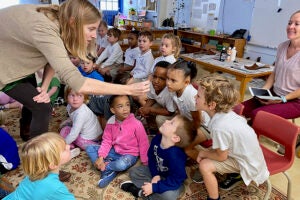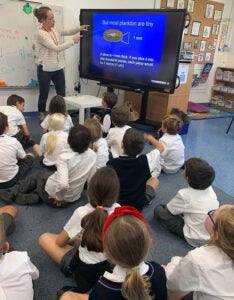An Early Introduction to Science

In January, primary students at two local schools heard from BIOS scientists as part of the Institute’s Curriculum Enrichment Program, which supports science, technology, engineering, and mathematics (STEM) learning in the classroom. Amy Maas, a comparative physiologist and biological oceanographer, spoke with a group of three to six-year-olds at Somersfield Academy about her experiences conducting research in Antarctica on the impacts of ocean acidification on tiny marine snails. During her visit, students saw photographs from her trips and got to see these marine snails, called pteropods, up close.
Primary students at Saltus Upper Primary School and Somersfield Academy gained an early introduction to ocean science in January through in-school presentations from two BIOS scientists. The presentations, part of BIOS’s Curriculum Enrichment Program, supported local teachers who wanted to enhance science, technology, engineering, and mathematics (STEM) content in their classrooms through immersive experiences with their students.
On January 21, BIOS marine biologist and reef ecologist Samantha de Putron spoke to a group of 18 P3 students in Trista Riihilouma’s class at Saltus Upper Primary School. The class was learning about sharks and plankton, and de Putron gave a multimedia presentation that introduced the basics of plankton biology and ecology. Then, using microscopes borrowed from the senior school at Saltus, students investigated plankton and coral samples.

Samantha de Putron, a marine biologist and reef ecologist, spoke with P3 students at Saltus Upper Primary School. During her visit she gave a multimedia presentation on the basics of plankton biology and ecology, then helped students look at plankton and coral samples under microscopes. Photo by Trista Riihilouma.
“For many of these students, this was their first time using a microscope,” de Putron said. “They searched through live plankton samples, tried to identify the most common zooplankton groups, and drew what they saw. The students were very engaged and excited to actually be seeing these tiny animals they had been learning about.”
A week later, BIOS comparative physiologist and biological oceanographer Amy Maas visited a class of 21 students, ages three to six, taught by Jennifer Bielby and Avornell Kuzyk at Somersfield Academy. Maas shared the research she conducted in Antarctica, where she traveled twice in 2007 and 2008 during graduate school to study the effect of ocean acidification on tiny marine snails called pteropods. During her presentation, Maas explained what it’s like to live and work at the McMurdo Station, a US research center located on the southern tip of Ross Island in Antarctica. She also talked about the clothes researchers and staff wear to stay warm and how the sun never set.
However, the real crowd pleaser was her collection of photographs of some of Antarctica’s notable residents—seals and penguins—as well as the scientific equipment used to carry out research in this remote location. “I’ve never had a science presentation with so many big machines in it,” Maas said after her talk, noting that the machinery photos were a specific request made by her two sons, ages two and four, when they saw her working on the presentation at home.
In addition to bringing scientists into classrooms, the BIOS Curriculum Enrichment Program offers a variety of laboratory and field-based experiences for students, including snorkel trips; excursions to Nonsuch Island; lectures on the water cycle, hurricanes, invasive lionfish, and plankton; and workshops on climate change and marine debris. In recognition of the financial limitations of schools, Ocean Academy Field Trip Grants are available to support these experiences.
For more information on the BIOS Curriculum Enrichment Program, please visit www.bios.edu/education/curriculum-enrichment-program
